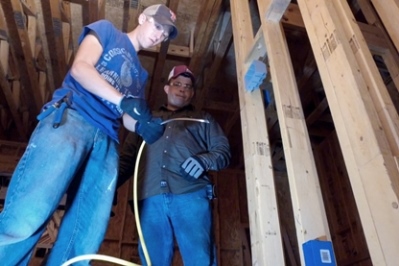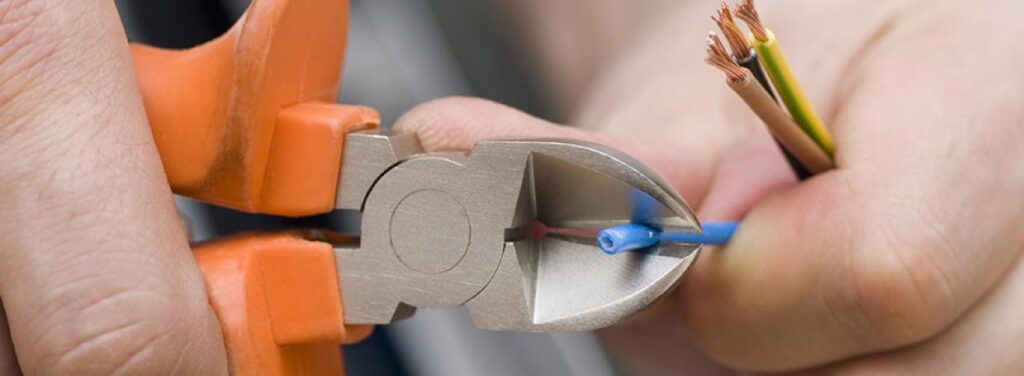Comfort, Durability and Safety: Choosing Electrician Tools and Equipment
As an electrician, you know that you can’t do your job without the right electrical tools and equipment. While there’s no substitute for your knowledge, without your trusty tools both basic and advanced, you’ll be limited.
After all, no matter how talented you are, you can’t exactly strip wires with your hands or install a new fixture without a tool belt full of everything you’ll need for the task. There’s a reason there’s a whole market for tools for professionals like yourself.
How to Choose the Best Electrical Tools and Equipment
Choosing the right electrician tools is difficult because there is such a range of quality. You want to fill your electrician’s tool kit without spending too much money for a fancy brand name, but you also don’t want to end up with a screwdriver that snaps when you first use it. Here are the main things to keep in mind to choose the best electrician tools:
Comfort
Some of your electrical hand tools are going to be used again and again, all day, every day, so comfort matters. When choosing a screwdriver, hammer or pair of pliers, for example, you should look for a handle with a soft texture and a comfortable rubber grip that fits your hand well. Squeezing your hand against a hard handle will be uncomfortable and make it much harder for you to work. Your electrician tool belt should also fit you well and be comfortable to wear, so that you don’t hurt your back or your hips on the job.
Durability
There’s no point saving money by buying poor quality tools, especially when replacing them will mean spending extra money. You may want to consider an SBA loan so that you can get better-quality equipment. Many of the tools you’ll use are sold both in household, occasional-use versions and as heavy-duty industrial tools. Although they might look similar, a professional screwdriver will last longer, stand up to harder use and make your job easier than the same screwdriver marketed at home DIY people.

Residential Electrician
Need an electrician fast? The needs of every individual customer are important to us. focus of providing quality residential electric services for your home combined with honesty has made us the first choice of many residential clients worldwide. You can count on us to take care of your electrical needs – day or night
Electrical Services for Homes
Ceiling Fan Installation / Maintenance
Breakers and Fuses
Code Corrections
Outlets and Circuits
Track and Accent Lighting
Service Panel Upgrades
High-Tech Troubleshooting
Dedicated Computer Circuits
Telephone and Data Lines
Security & Landscape Lighting
Surge Protectors
Electric Water Heaters
Transformers
Smoke Detectors
Ground Fault Interrupt Circuits
Appliance Circuits
Hot Tubs and Spa wiring
Standby generator installations
Electric Heating
Electric Car Chargers
Lighting Design and Maintenance
Bathroom Lighting Installations
Bedroom Lighting Installations
Dining Room Lighting Installations
Kitchen Lighting Installations
Home Theatre Lighting Installations
Home Office Lighting Installations
Electrical Motors
Exhaust Fans
The Expert Electric Difference
Your call will be answered by one of our customer care representatives who will listen to your needs.
will schedule a specific appointment date and time for the electrician to evaluate, price and complete your job.
evaluating your needs, the electrician will provide you with a written estimate including project details before any work is done.
the price is acceptable and materials are available, the electrician in most cases is prepared to do the work for you the same day we come out.
electrician will also coordinate a mutually agreeable schedule to complete your work should there be something preventing the work from being done on that same day.
completion the electrician will review all work completed with you and to ensure your complete satisfaction and review any final instructions regarding your installation or repair.
office staff will perform a follow up within 48 hours with you to ensure your system is still working fine and you are completely satisfied.
your inspection and satisfaction, an invoice will be provided for your approval.

Electrician
How to Become an Electrician
From basic lighting and electrical utility needs to the mega-watt commercial and industrial electrical wiring applications that keep businesses, hospitals, schools, and data centers humming, electricians are indispensable to life in the modern world. This is the underlying factor that explains why professionals in the electrical trade now earn salaries as high as $88,130, and why the trade is seeing job growth projections in the double-digits for the ten-year period leading up to 2025
The rules and regulations that govern electrician licensing are different in every state. Even within a state, individual counties and cities often have their own rules and licensing authorities. As you work to complete your apprenticeship program, become licensed as a journeyman and eventually go on to become a master electrician and independent contractor, you will work closely with your local electrical trade regulatory agency.
Follow the steps in this guide and review the rules specific to your state and local jurisdiction to learn how to become an electrician:
Gain the Technical Training and Job Experience Required to Qualify for a Journyman License
Pass an Examination to Become Licensed as a Journeyman Electrician
Gain the Experience and Additional Qualifications Required to Become a Master Electrician
Become Licensed as an Independent Electrical Contractor
Gain the Technical Training and Job Experience Required to Qualify for a Journeyman License
Your first order of business will be to make arrangements for gaining the real-world, on-the-job experience and classroom-based technical training required to become skilled in the trade and to meet the journeyman licensing requirements in your jurisdiction.
In most cases, licensing jurisdictions cover an entire state, but in many cases licensing takes place at the county or city level. All licensing jurisdictions are free to establish their own on-the-job training and classroom hour requirements that must be met before you can take the journeyman examination. In virtually all cases, this would mean spending between four and six years working as an apprentice or trainee for a licensed electrical contracting company or state utility in order to satisfy the standard requirements. In most cases, you would simply transition into full time employment at the journeyman level with that same employer once you have met the licensing requirements.

Advice for Future Electricians
Many industries are facing the same problem. Every day, 8,000 U.S. baby boomers turn 65, and the rigors of physically demanding trades sometimes force workers into retirement at that suggested age. That means the electrical industry might be losing experienced workers faster than other less strenuous professions
That’s why we like to draw attention to organizations that provide training for apprentice electricians and other trades
Electrician-specific programs are available through national associations like the Independent Electrical Contractors (IEC), as well as the International Brotherhood of Electrical Workers (IBEW) and the National Electrical Contractors Association (NECA). Klein recently added a $2 million Double-Down pledge to support education and training programs through IBEW-NECA and their joint program, The Electrical Training Alliance.
Tips for Aspiring Electricians
Do your research. Many national and local programs exist to help jumpstart your career as an electrician. Check out the links above to see which route to apprenticeship is right for you.
Meet the minimums. When applying for an apprenticeship or technical school, pay attention to the minimum requirements. Generally speaking, you must be at least 18 years old, with a high school diploma or equivalent. And, you must have color vision – electricians need to be able to identify wires by color.
Prepare yourself. Heavy lifting, bending, squatting, climbing and squeezing into tight spaces are everyday activities for electricians across industries. Keeping your body and your gear in good shape will help you keep pace with coworkers and stay safe in the process.
Think critically. Memorizing code books and techniques is a good start, but you also need to be able to diagnose malfunctioning systems on the fly. Professionals don’t have time to tinker, so get to know what diagnostic tools you have access to, and how and when to use them.
Pay attention. Take advantage of all the resources you have during your apprenticeship, especially the experienced electricians around you. You have thousands of hours ahead of you to absorb everything they have to offer, which you can eventually turn into your own way of working. Go in willing to learn and you might be surprised at how much they have to teach you.
Keep learning. An electrician’s education never ends. The on-the-job experience of an apprenticeship is essential to becoming a great electrician, but so is staying on top of code changes, new technology and new systems. Smart houses, electric cars and an otherwise growing dependence on complex electrical systems will keep U.S. electricians in demand for a long time to come.
How to start an electrical business
So, if you’ve been thinking about starting an electrical business, now might be the right time to go for it. Whether you’re a qualified electrician with a wealth of experience, a trainee looking to their future or a DIY-er wanting to take their skills to the next level, you could help fill that skills gap and profit from the high demand.
Running a business isn’t for everyone; it can be hard work, but it can also be incredibly rewarding, giving you the opportunity to be your own boss, have more flexibility with your time and grow your income. We’ve put together this guide to help you decide if it’s the journey for you.
What does a self-employed electrician do?
Very broadly speaking, the job of any electrician is to install, maintain and repair electrical devices and wiring. What you do day-to-day will depend on where you work and what area you specialise in
Here are some examples of specific tasks you may be required to complete as an electrician:
Planning the layout and installation of wiring in a building
Installing telephone, security and fire alarm systems
Maintaining circuit breakers, fuses and wiring
Testing, finding and repairing faults or malfunctioning systems
Reviewing the work other electricians have done to make sure it meets safety standards
Teaching apprentices
Become a qualified electrician
There are many routes to becoming a qualified electrician. You might start out as an apprentice where you can learn on-the-job or, if you’re an adult learner or an apprenticeship doesn’t suit you, you might do a classroom-based qualification. Doing your research and finding the right option for you is key